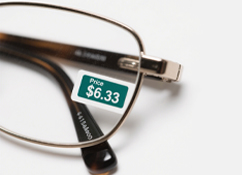Iconic Celebrity Eyeglass Frames: Did They Become Their Most Famous “Signature Pieces”?
Clothing has always been a powerful way to express identity. From slogan tees to small accessories like earrings, every piece sends a message about who we are. For legends across art, music, and tech, that signature often includes a pair of glasses—frames so tied to their persona, they’re as recognizable as their work.
Think of Rembrandt’s berets or Steve Jobs’ black Issey Miyake sweaters: these pieces weren’t just clothing—they were part of how the world saw them. The same goes for eyeglasses. Swiss architect Le Corbusier’s round frames, director Woody Allen’s classic black specs, or artist Andy Warhol’s transparent frames—these glasses are as iconic as their owners. Let’s dive into the stories behind 5 legendary frame brands and the icons who made them famous.
Jacques Durand (Ryuichi Sakamoto’s Go-To): Timeless Frames for the Music Maestro
When music legend Ryuichi Sakamoto announced his rectal cancer diagnosis, fans worldwide rallied around him—not just for his Oscar-winning score for The Last Emperor or his role in Merry Christmas, Mr. Lawrence, but for the quiet grace he brings to every stage. And that grace often includes a pair of Jacques Durand frames.
Sakamoto’s go-to style? The Jacques Durand Paques 506, in two shades:
Black matte: With a vintage texture that complements his silver hair, he wears these to concerts, TV shoots, and formal events—understated, yet instantly recognizable.
Tortoiseshell: Bolder and more playful, he pairs these with avant-garde outfits for electronic music sets or casual hangs with friends.
Jacques Durand, the French brand behind the frames, is all about timelessness. Founder Jacques Durand lives a minimalist life (he’s worn the same black Intimissimi tees and Levi’s 555 jeans for decades) and built his brand to fight fast fashion. Before launching Jacques Durand, he worked on Philippe Starck’s iconic rotating-temple frames for Alain Mikli—frustrated by “trendy” glasses that faded fast, he set out to make frames that last.
His designs skip nose pads (relying on a single bridge for support) and use curved temples for comfort. No seasonal collections, no flashy ads—just 5 simple categories (Acetate, Sunshine, Metal, Plus, Japanese Collection) and frames built to outlast trends. For Sakamoto, that ethos fits: his music is timeless, and so are his glasses.
LINDBERG (Phil Jackson, Bill Gates): Lightweight Titanium Frames for Icons Who Value Comfort
Basketball coach Phil Jackson—nicknamed “the Zen Master”—led the Bulls to 6 NBA titles and the Lakers to 5. Even today, his thin metal glasses spark 1990s nostalgia: those are LINDBERG’s Air Titanium frames, co-created with Danish architecture firm Dissing+Weitling in the 1980s.
The frames’ claim to fame? No screws, rivets, or welds—making them the world’s first pure titanium rimless frames. Lightweight and durable, they’ve won over F1 drivers (Stirling Moss), tech giants (Bill Gates, who wore them on Time and Fortune covers), and anyone who hates heavy glasses.
LINDBERG’s roots are in Aarhus, Denmark—a city known for cutting-edge architecture. Founder Henrik Lindberg grew up surrounded by design that balances form and function, and he brought that to eyewear. The brand never uses screws, relies on high-strength titanium, and holds 95 design awards (including Japan’s Gold Mark and Germany’s Industrial Design Award). For Jackson and Gates, LINDBERG isn’t just glasses—it’s a blend of practicality and quiet sophistication.
HAKUSAN MEGANE (John Lennon): Handcrafted Frames for a Beatle’s Final Years
In December 1980, John Lennon was shot outside his New York apartment. A year later, his wife Yoko Ono featured his yellow-framed sunglasses on the cover of her album Season of Glass—a tribute to the Beatle who’d made those frames famous. Those were HAKUSAN MEGANE’s MAYFAIR model, released in 1978.
Lennon discovered HAKUSAN MEGANE during trips to Tokyo. Retired from music at the time, he spotted the frames in a Harajuku men’s shop and asked the owner to connect him with the brand. On a casual afternoon, HAKUSAN showed him 5 styles—he picked the MAYFAIR immediately, buying three colorways: clear frames with light blue lenses, yellow frames with dark sunglasses, and tortoiseshell with light brown lenses. The yellow pair became his favorite.
HAKUSAN MEGANE, a Japanese brand, specializes in handcrafted cellulose acetate frames. It avoids trendy overhauls—instead, it tweaks classic designs (like 1981’s widened TITO frame, based on vintage styles) and shares its philosophy through magazines like Hakusan Catalogue. For Lennon, who once said, “I won’t change my appearance to fit anything,” the simple, classic MAYFAIR was perfect: it let his music shine, not his glasses.
Maison Bonnet (Le Corbusier): Custom Frames for the “Master of Functionalism”
Le Corbusier is famous for designing Marseille’s Unité d’Habitation and the LC furniture collection—but few know he had a signature pair of frames crafted by French custom brand Maison Bonnet. Those thick round glasses accompanied him through every architectural project, becoming so iconic that architects like Philip Johnson and I.M. Pei adopted similar styles.
Maison Bonnet is a family-run craft legacy. Founded in 1950 by Robert Bonnet, it’s passed down through generations: Robert’s son Christian won France’s highest crafts honor, Meilleur Ouvrier de France (Master Craftsman of France), in 2000, and Christian’s son Franck now runs the brand.
What makes Maison Bonnet special? One-on-one customization. A craftsman consults with you on your lifestyle, measures your cheekbones, eyelash length, and pupillary distance, then hand-makes the frame in over a dozen steps. You try on a prototype, tweak the fit, and get a frame that’s uniquely yours. The brand only makes 1,000 pairs a year—attracting clients like Audrey Hepburn and Yves Saint Laurent. It still sells two Le Corbusier-inspired styles (1950 and 1965) for fans who want a piece of his legacy.
MOSCOT (Andy Warhol, Woody Allen, Johnny Depp): New York’s Retro Frame Legend
In 2019, the Whitney Museum’s Andy Warhol retrospective featured more than his pop art—it included a pair of transparent MOSCOT frames. Those glasses were in Warhol’s self-portraits, candid photos, and even his trips to Studio 54: they were as much a part of his New York vibe as The Factory.
MOSCOT’s story starts in 1915, when Hyman Moscot opened a shop on Manhattan’s Lower East Side. During the Great Depression, his son Sol started offering free frame repairs and handwritten thank-you notes—a tradition that continues today. The brand blew up in 1955, when James Dean wore MOSCOT’s Lemtosh frames in Rebel Without a Cause—sparking a nationwide trend.
Today, Lemtosh is still a favorite: Johnny Depp wore them in Secret Window and on red carpets; Woody Allen has sported them in films like New York Stories and Manhattan, where he played a scholarly writer. For these icons, MOSCOT isn’t just glasses—it’s a piece of New York history. As brand operator Zack Moscot put it: “When you put on MOSCOT, you’re carrying a little bit of this city with you.”
Why These Frames Matter: More Than Just Glasses
For these legends, frames weren’t just about seeing clearly—they were about staying true to their values. Sakamoto chose Jacques Durand for its timelessness; Le Corbusier picked Maison Bonnet for its craftsmanship; Warhol loved MOSCOT because it felt like home. When a pair of glasses is worn for years, it becomes an extension of who you are—witnessing late nights in the studio, championship wins, and quiet moments with friends.
In the end, these frames aren’t just accessories. They’re part of the legacy—proof that the best style isn’t about following trends. It’s about finding something that fits you.











